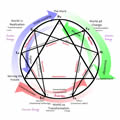We Reason with Ourselves All the Time
2015-01-08
The developed skill of reasoning is quite rare in most of the people that we meet, and this probably includes ourselves. But that doesn’t by any means suggest that we don’t use reasoning. In fact we use it all the time, but usually in a very unskilled way.
For example, we send someone a text message and they don’t reply. For a while we wait patiently, but after a bit we sometimes go into a bizarre reasoning process about how rude and discourteous this other person is. Or we become convinced that the other person is irritated with us, or is playing games with us. We then fire off another text message responding to the presumed rudeness or irritation. Again we don’t hear from the other person and now we’re sure that something has happened to them and we start contacting others to find out what’s going on. This usually has the unintended effect of worrying others and starting several new chains of events. Eventually we discover that the other person simply had their phone turned off. Somewhat embarrassed we dismiss the whole thing as an amusing incident to be forgotten as soon as possible.
There are many things that we could learn from this event if we took the time and trouble, but let’s just focus on one point. It’s a point that is crucial to real reasoning.
This one point is the ability to consistently acknowledge to ourselves and to others what we don’t know.
This sounds easy. But in practice it’s extremely difficult because our mind is a pattern matching machine that is constantly striving to make sense of the world and to fill in the gaps of what we don’t know with some kind of pattern or explanation. In many ways this is a holdover survival skill from our days in the wild. It can also be a necessary survival skill in business or in relationships. But given our generally immature emotional nature, it’s usually a survival skill run amuck.
It can also be embarrassing to “not know”. In traveling through Central America for many months I soon learned that if you asked a local for directions, they would always, always, always come up with detailed instructions about how to get to your destination. I don’t recall a single instance where a local simply said, “I don’t know”. This was unfortunate, because about 40% of the time the locals simply didn’t have an accurate response. But they were obviously too embarrassed to just say that they didn’t know.
So our task, in most cases of real reasoning, is to bear the tension of ‘not knowing’; or the embarrassment of not knowing; to only fill in the gaps with real facts or genuine intuitions; to not fill in the gaps with fantasy because we can’t stand the void; to enquire and verify before we imagine.
This skill of being able to hold open a void, a vacuum, has other uses as well. So it’s a very good skill to develop. It’s one of the many abilities needed for real reasoning. Can you think of some others?
- John Hutcherson's blog
- Log in to post comments

Comments
more emotional bits
Certainly, as John says, there are many things we could learn from such events, and not-knowing is a deep and vital practice. At the risk of being clever, one might say that we don't know not-knowing as well as we think we do, so we also need to practice not-knowing with respect to not-knowing.... (I hope that got a laugh from someone). Anyway, for what it's worth, I also encourage all of us to remember that we don't know, as I will try to remember myself.
I would also say, though, that "external considering" averts these misunderstandings. When we remember that we are not the center of the universe, when we try to see things from others' perspectives, when we remember that we offend others in similar ways, when we don't keep accounts, when we don't allow negative emotions to take root in us, we avoid this stuff. In my experience, not-knowing is a vital intellectual accompaniment to moving into deeper, quieter, and more stable emotions.
As one enlightened person recommended we pray, "Forgive us our debts, as we forgive our debtors...."
It is as simple as "Try to be kind."
the long way around...
Aldous Huxley went through life intellectually for a long time, he wrote many books, he took part with Bennett in Ouspensky's groups, he advocated psychedelics, and he had a good share of hardship. Brave New World and Doors of Perception are worth reading, but his last book, Island, gives the best sense of the man he grew into.
At the end of Huxley's life, when he was dying of cancer, he summed up everything he learned as follows:
It's a bit embarrassing to have been concerned with the human problem all one's life and find at the end that one has no more to offer than "Try to be a little kinder...."
In its own way, that, too, seems to be a statement about not-knowing.
many sides
i would say that widening one's view to look at things from as many sides or angles as possible is crucial in reasoning.